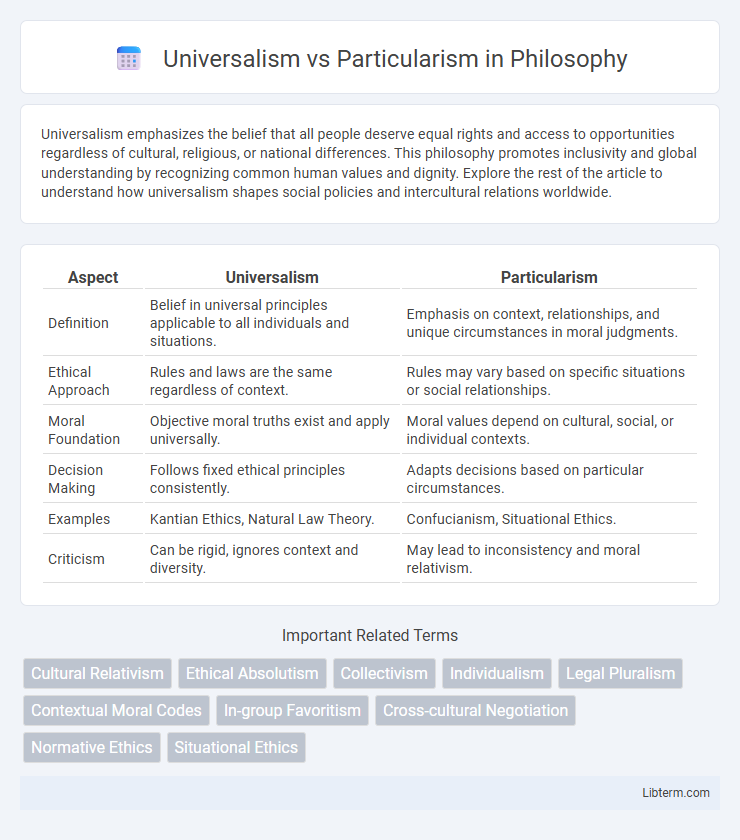Universalism emphasizes the belief that all people deserve equal rights and access to opportunities regardless of cultural, religious, or national differences. This philosophy promotes inclusivity and global understanding by recognizing common human values and dignity. Explore the rest of the article to understand how universalism shapes social policies and intercultural relations worldwide.
Table of Comparison
| Aspect | Universalism | Particularism |
|---|---|---|
| Definition | Belief in universal principles applicable to all individuals and situations. | Emphasis on context, relationships, and unique circumstances in moral judgments. |
| Ethical Approach | Rules and laws are the same regardless of context. | Rules may vary based on specific situations or social relationships. |
| Moral Foundation | Objective moral truths exist and apply universally. | Moral values depend on cultural, social, or individual contexts. |
| Decision Making | Follows fixed ethical principles consistently. | Adapts decisions based on particular circumstances. |
| Examples | Kantian Ethics, Natural Law Theory. | Confucianism, Situational Ethics. |
| Criticism | Can be rigid, ignores context and diversity. | May lead to inconsistency and moral relativism. |
Understanding Universalism: Core Principles
Universalism emphasizes applying general rules and standards consistently across all situations, ensuring fairness and equality regardless of individual circumstances. It prioritizes objective criteria and universal laws over personal relationships or contextual nuances. This approach is fundamental in legal systems, international human rights frameworks, and ethical theories prioritizing uniformity and impartiality.
Defining Particularism: Key Characteristics
Particularism emphasizes the importance of contextual factors and relationships when applying rules, prioritizing unique circumstances over universal laws. It values flexibility, adapting decisions based on specific social connections and situational nuances rather than rigid principles. This approach contrasts with universalism by focusing on the distinctiveness of each situation, allowing for personalized and relationally sensitive judgments.
Historical Roots of Universalism and Particularism
Universalism and particularism originate from early philosophical and cultural traditions that shaped social norms and legal systems. Universalism, rooted in Enlightenment ideals and Kantian ethics, emphasizes general rules and equal application of principles across contexts. Particularism emerges from anthropological and historical contexts valuing relationships, traditions, and situational ethics, reflecting localized social practices and community-specific norms.
Universalism vs Particularism: A Comparative Overview
Universalism emphasizes consistent application of rules and standards across all situations, promoting impartiality and equality in decision-making processes. Particularism values context, relationships, and unique circumstances, allowing flexibility and exceptions based on specific needs or social bonds. Understanding Universalism versus Particularism provides critical insights into cultural differences impacting organizational behavior, legal systems, and international relations.
Universalism in Law, Ethics, and Society
Universalism in law emphasizes applying consistent legal principles across all individuals, ensuring equal treatment regardless of personal or cultural differences. Ethical universalism advocates for moral standards that transcend local customs, promoting values like justice and human rights universally. In society, universalism fosters social cohesion by encouraging shared norms and policies that support equality and impartiality across diverse populations.
The Role of Particularism in Cultural Identity
Particularism plays a crucial role in cultural identity by emphasizing the importance of context, relationships, and unique circumstances in social interactions. It shapes how individuals prioritize loyalty, trust, and group membership over universal rules, reinforcing specific cultural norms and values. This focus on particularism helps maintain cultural distinctiveness and social cohesion within communities by valuing personalized and situational judgment.
Universalism and Particularism in Business Practices
Universalism in business emphasizes consistent rules and standards applied equally to all partners, ensuring predictability and fairness in contracts and negotiations. Particularism prioritizes relationships and context, adapting agreements and decisions based on individual circumstances and the nature of business partnerships. Companies practicing universalism often rely on formal policies and legal frameworks, while those favoring particularism value flexibility and trust-building within specific cultural or organizational contexts.
Globalization: Bridging Universal and Particular Values
Globalization drives the interplay between universalism and particularism by promoting shared values such as human rights and environmental sustainability while respecting cultural diversity and local traditions. Multinational organizations and international agreements often balance universal ethical standards with particularistic social norms to achieve global cooperation and legitimacy. This dynamic fosters inclusive policies that integrate global frameworks with localized adaptations, strengthening cross-cultural understanding and economic integration.
Case Studies: Universalism and Particularism in Action
Case studies of Universalism versus Particularism reveal how cultural contexts shape ethical decision-making and business practices. In Universalism-oriented societies like the United States, rules and laws are applied consistently to ensure fairness and equality, while Particularism-driven cultures such as China emphasize relationships and situational factors when interpreting rules. These contrasting approaches impact conflict resolution, contract enforcement, and organizational loyalty across global markets.
Future Perspectives: Harmonizing Universalism and Particularism
Future perspectives on Universalism versus Particularism emphasize integrating global ethical standards with cultural and contextual sensitivities. Developing adaptive frameworks that respect local traditions while upholding universal human rights fosters inclusive and equitable policy-making. This harmonization supports sustainable development and cross-cultural cooperation in increasingly interconnected societies.
Universalism Infographic

 libterm.com
libterm.com